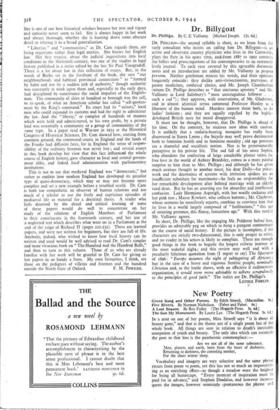Dr. Billygoat
DR. PHiLLIG0—the second syllable is short, as we learn from the surly consultant who insists on calling him Dr. Billygoat—is an active and observant country physician who lives in the Cotswolds, plays the flute in his spare time, and from 1887 to 1902 commits the follies and preoccupations of his contemporaries to an extremely lively journal. To each year covered by this agreeable document notes and an introduction are added by Mr. Vulliamy in propria persona. Neither gentleman minces his words, and their opinions frequently coincide: they dislike anti-vivisectionists, purveyors of patent medicines, confused clerics and Mr. Joseph Chamberlain (whom Dr. Philligo describes as "that unctuous apostate" and Mr. Vulliamy as Lord Salisbury's "most unscrupulous follower . . . such a cad "); they approve, with reservations of Mr. Gladstone, and in almost identical terms commend Professor Huxley as a liberator of the human mind. Murders interest them both, so do ladies' fashions ; and they are equally repelled by the highly- deireloped British taste for moral disapproval.
It must not be thought,, however, that Dr. Philligo is ahead of his time. On the contrary, he receives new ideas with caution. It is unlikely that a malaria-bearing mosquito- has really been discovered in Sierra Leone ; the bicycle may well prove detrimental both to feminine health and to feminine morality ; old age pensions are a shameful and socialistic notion. Nor is he preternaturally perceptive in his private life. The sad fall of his niece Sophia, who abandons the confection of large unsaleable plaster saints for free love in the world of Aubrey Beardsley, comes as a more painful surprise to him than to Mrs. Philligo ; and although he has given much anxious thought to another niece, his dear Dolly—for poker. work and the decoration of screens with imitation spiders are an insufficient substitute for matrimony—he feels no responsibility for her remarkable development after belated marriage with an elderly rural dean. But he has an unerring eye for absurdity and intellectual confusion. Lady Hermione Aspreigh, with her woolly cockatoo and her pink teas ; Mayor Kewkett, who collects buttons ; Mr. Claybrow, whose sermons he mercilessly reports, combine to convince him that he lives in a world largely composed of " futilitarians," "this age of strutting pretence, this flimsy, featureless age." With this verdict Mr. Vulliamy agrees.
In short, Dr. Philligo, like the engaging Mr. Polderoy before him, provides an admirable peg on which to hang a pungent commentary on the course of social history. If the picture is incomplete, if the characters are strictly two-dimensional, this is only proper to satire, and no reader in his senses is likely to complain. There are enough good things in the book to beguile the longest railway journey or the most wakeful night,; and this review may well end with a peculiarly felicitous quotation from (I regret to say) The Spectator of 1896: "Europe assumes the right of subjugating all Africans; but in the case of a brave and vigorous Semitic people, nominally Christian and, as the battle shows, with an effective if rudimentary organisation, it would seem more advisable to adhere scrupulously to the principles of good faith." The holies are Dr. Philligo's.
LEITICE FOWLER.


























 Previous page
Previous page